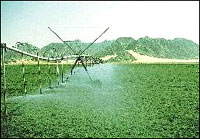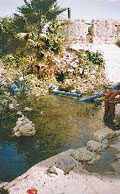A variety of explanations have been offered as to why Israel is reluctant to redistribute water resources. The most obvious reason is that doing so would require a change in Israeli lifestyles: no more private swimming pools and green lawns. But the motives go deeper than that, according to Robin Twite, director of the Environment Program for the Jerusalem-based Israeli/Palestine Center for Research and Information, a public-policy think-tank. Twite says Israelis have what he calls a “mythical belief in development.”
“Since first settling the land over 100 years ago, Israelis have never stopped building, developing, and expanding their homes and infrastructure. And the kibbutz, agricultural settlements, and farms hold a special place in Israeli affections. The strive to develop has a momentum of its own and tampering with it could be politically dangerous,” Twite says.

An irrigation system in Israel.
Photo: USGS.
Henry Gold, an engineer and chair of Israel’s Committee for Public Transport, says that when it comes to the water crisis, the prevailing attitude is that technology will save the day. “The government has just decided to start building what will be the world’s largest water desalination plant,” Gold said. “And over the next 10 years, 20 more desalination plants are being established. But this is irresponsible, as desalination can only be part of the solution. Reducing consumption and encouraging responsible use remains critical.”
Gold said the emphasis needs to shift toward political action and measures to make water conservation economically enticing. “In Israel at the moment, the local municipality sells water. It buys the water from the central company and sells it on at a 300- to 400-percent mark-up. Under this system, the municipality has no interest whatsoever in conserving water use. But the central government is doing nothing to change it.”
Another Israeli environmental group, the Israel Union for Environmental Defence, has gone to the courts to try to jump-start political action around water issues. The group is concerned that the nation’s water crisis is being compounded as rivers and groundwater resources are contaminated by poorly treated municipal sewage as well as military and industrial waste.
In May 2000, the IUED petitioned the Supreme Court for funds to decontaminate a water source in Tel Aviv. Testing at the site revealed the presence of trichloroethylene, hydrocarbon solvents, heavy metals, and other hazardous industrial effluents, which led to the closure of drinking water wells in the area.
IUED’s petition was successful, but still amounts to little more than closing the barn door after the horses are gone. By not adequately addressing the water crisis when making building and planning decisions, Israeli politicians are achieving short-term survival by risking the long-term stability of the Israeli state.
Milk and Honey on the Other Side?
If the present water situation is tense, the future one is simply untenable, according to Ayman Rabi, director of the Palestinian Hydrology Group. “At the moment, the water problem is one of efficient management above efficient use,” Rabi says. “There is enough for the current populations of Israel and Palestine, it just needs to be distributed fairly. The problem is that these populations are projected to double by 2025. There will, quite simply, not be enough water to sustain this population if today’s consumption pattern remains unchanged.”

Down on the kibbutz.
Photo: Foundation for Middle East Peace.
Perhaps mindful of that, the Israelis have made some attempts to address water consumption. Some 53 percent of drinking-quality water in Israel is currently used for agriculture. In 1995, a Ministry of Agriculture commission recommended cancelling allocations and subsidies to the agriculture sector, suggesting that if farmers bought water at market prices, they would use it more efficiently. The Water Commissioner’s office, however, rejected this idea outright.
Israel has also been at the cutting edge of some technological advances. In the 1960s, it gained worldwide admiration by developing a drip irrigation system, which efficiently delivers water to the root of the plant, dramatically reducing the amount of water needed to grow crops. Unfortunately, much of this technological research slowed down after Israel gained control of the water in the occupied territories during the 1967 war.
Meanwhile, lacking any option, many Palestinians — especially those not connected to the water network — have adopted water-efficient lifestyles, which Israelis could copy without significantly changing their lives. Rainwater harvesting, whereby water is collected on roofs and stored in cisterns, is becoming more and more widespread, and usually allows a family to be water self-sufficient for half the year. And many Palestinian villagers have started treating and recycling water on site, using simple earth filters. Three ponds are built on top of each other. Water that has been used for cooking and cleaning is passed through them and cleaned by the earth between the ponds. By the time it reaches the third pond, it is clean enough for agricultural use.

This Jericho spring has
served as a source of
drinking water for
thousands of years.
Photo: USGS.
But although practical solutions may be available, the problems, ultimately, require political management — and nothing is being done at the political level. This is hardly surprising as the two sides can barely bring themselves to talk to each other, let alone decide on how to manage their joint water resources.
Further complicating the matter is the fact some of the water resources that the Israeli and Palestinians share, such as the Jordan River, must also be shared with neighbouring countries. The Yarmouk-Jordan River basin serves Israel, Palestine, Jordan, Syria, and Lebanon. Israel and Jordan have made admirable attempts to jointly manage the Jordan River since signing a peace agreement in 1994. But Israel and Syria, in particular, are a long way from finding ways to cooperate. Indeed, the two countries are still formally at war over Israel’s occupation of the water-rich Golan Heights. Meanwhile, population growth and developmental pressures coupled with inefficient use in all five countries continue to deplete and pollute the water.
Israel is founded on a simple, central tenet: that any Jew, anywhere in the world, can immigrate and settle in the nation. Six million people currently live in Israel and the occupied territories, but there are an estimated 12 to 14 million Jews worldwide. Israelis may find that the land places caps on immigration levels whether they like it or not, if sustainable water consumption is not achieved and water becomes increasingly scarce. And if politicians continue to ignore the water issue, they may find that peace is equally hard to come by.
Part I: Israel and Palestine struggle over water in an arid land

